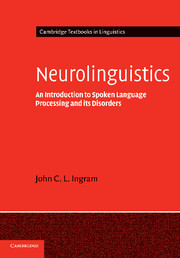Book contents
- Frontmatter
- Contents
- List of figures
- List of tables
- Preface and acknowledgements
- Note on the text
- Part I Foundational concepts and issues
- Part II Speech perception and auditory processing
- Part III Lexical semantics
- 9 Morphology and the mental lexicon
- 10 Lexical semantics
- 11 Lexical semantic disorders in aphasia
- Part IV Sentence comprehension
- Part V Discourse: language comprehension in context
- Glossary
- References
- Index
10 - Lexical semantics
Published online by Cambridge University Press: 26 January 2010
- Frontmatter
- Contents
- List of figures
- List of tables
- Preface and acknowledgements
- Note on the text
- Part I Foundational concepts and issues
- Part II Speech perception and auditory processing
- Part III Lexical semantics
- 9 Morphology and the mental lexicon
- 10 Lexical semantics
- 11 Lexical semantic disorders in aphasia
- Part IV Sentence comprehension
- Part V Discourse: language comprehension in context
- Glossary
- References
- Index
Summary
Introduction
In the previous chapter we inquired into the structure of words and the extent to which they can be decomposed into smaller constituents, morphemes. Morphological decomposition was seen to be justified, up to a point, on evidence from cross-modal semantic priming studies. The evidence suggested that morphological decomposition may be justified insofar as the morphological components of a word are semantically transparent, i.e. to the extent that the meaning of the whole word can be clearly related to the meanings of its component morphemes (e.g. indefensible = <not>(<defend>(<able>))). However, we did not provide an explicit account of ‘semantic transparency’, other than to appeal to language users' intuitions about the meanings of words. A theory of lexical semantics should provide an explicit account of word meaning; of how similarities and differences in word meaning are established, how various word meaning relations, such as synonymy (violin – fiddle), antonymy (long – short), hyponymy (horse – animal) etc., are established.
We defined morphology as the syntax of the word. This chapter concerns the semantics of words or word meanings. A useful theory of lexical semantics needs to account not only for the meaning of individual words but for how word meanings change in context with other words. Consider the meaning of good in the phrase good friend (<loyal, reliable>). Now consider the meaning of the same word in the phrase good lover or good meal.
Information
- Type
- Chapter
- Information
- NeurolinguisticsAn Introduction to Spoken Language Processing and its Disorders, pp. 199 - 220Publisher: Cambridge University PressPrint publication year: 2007
